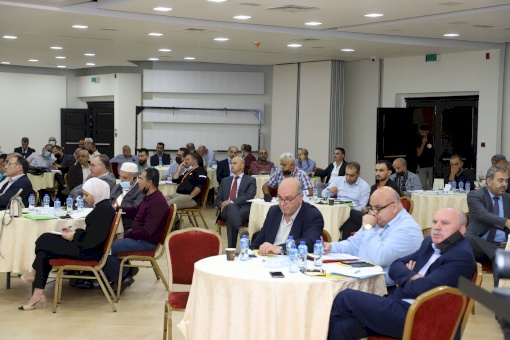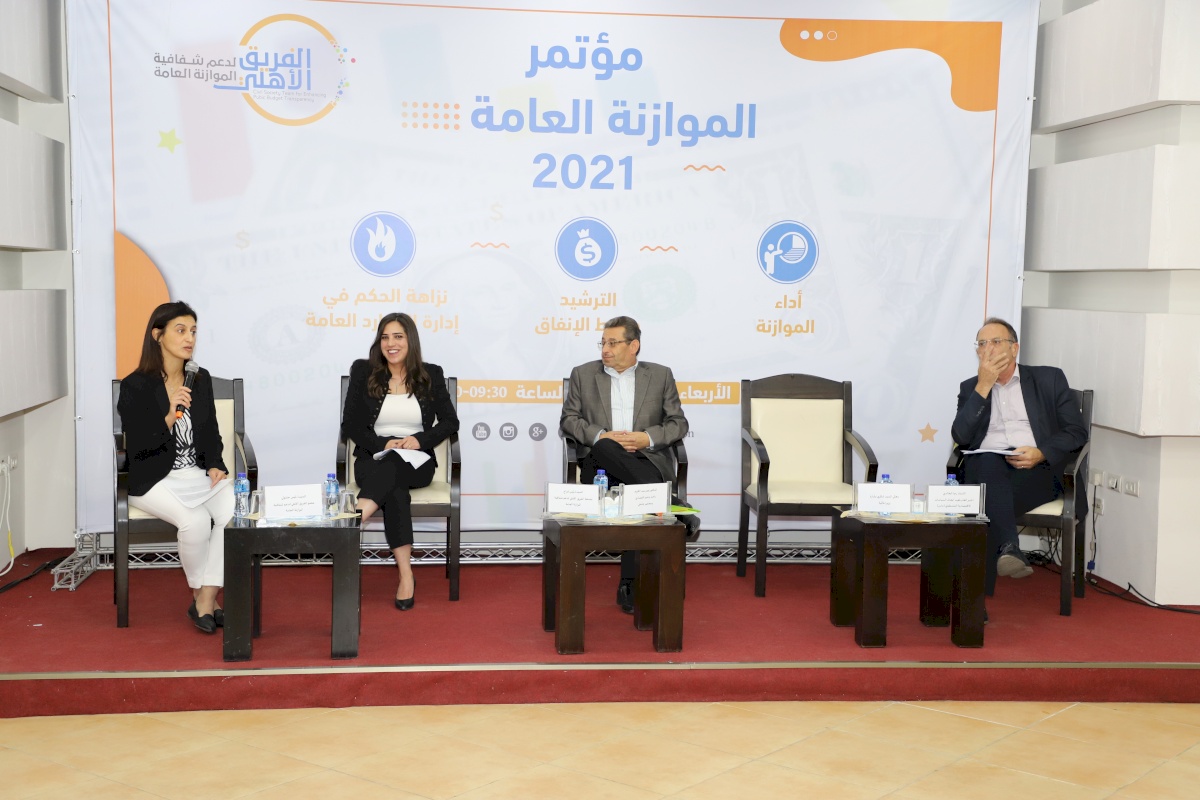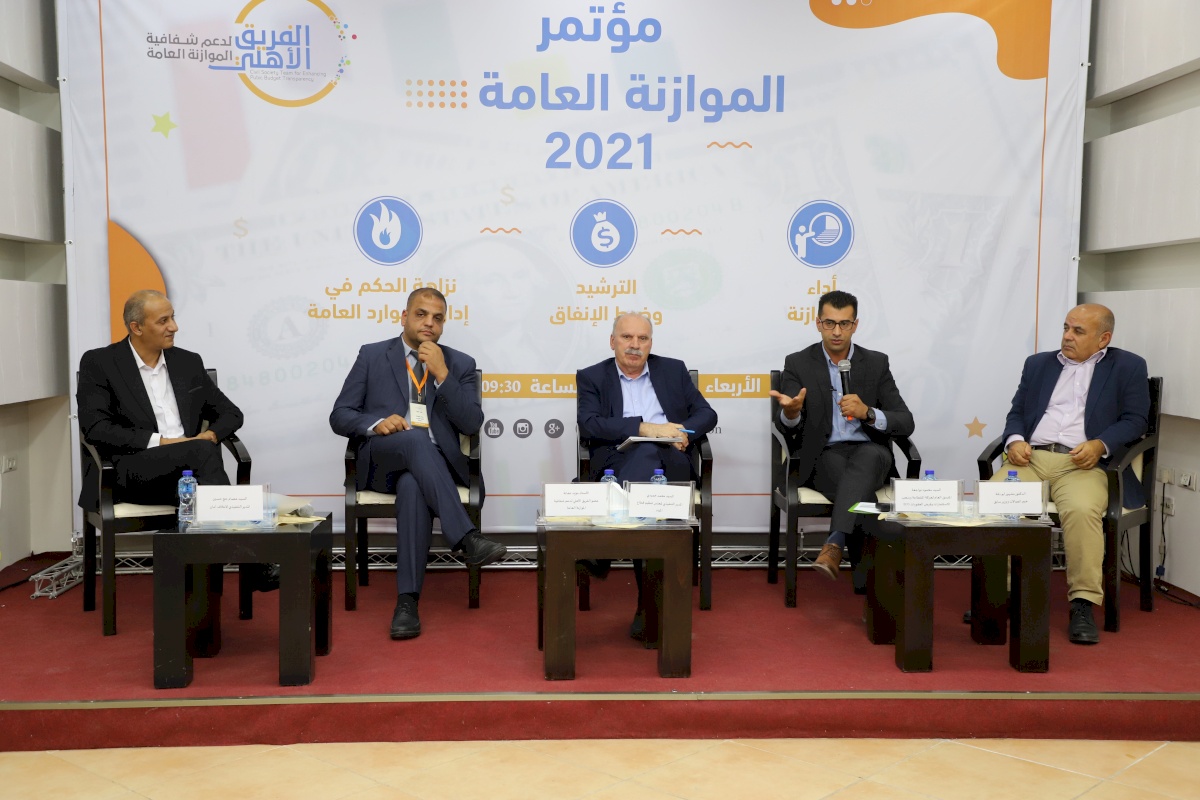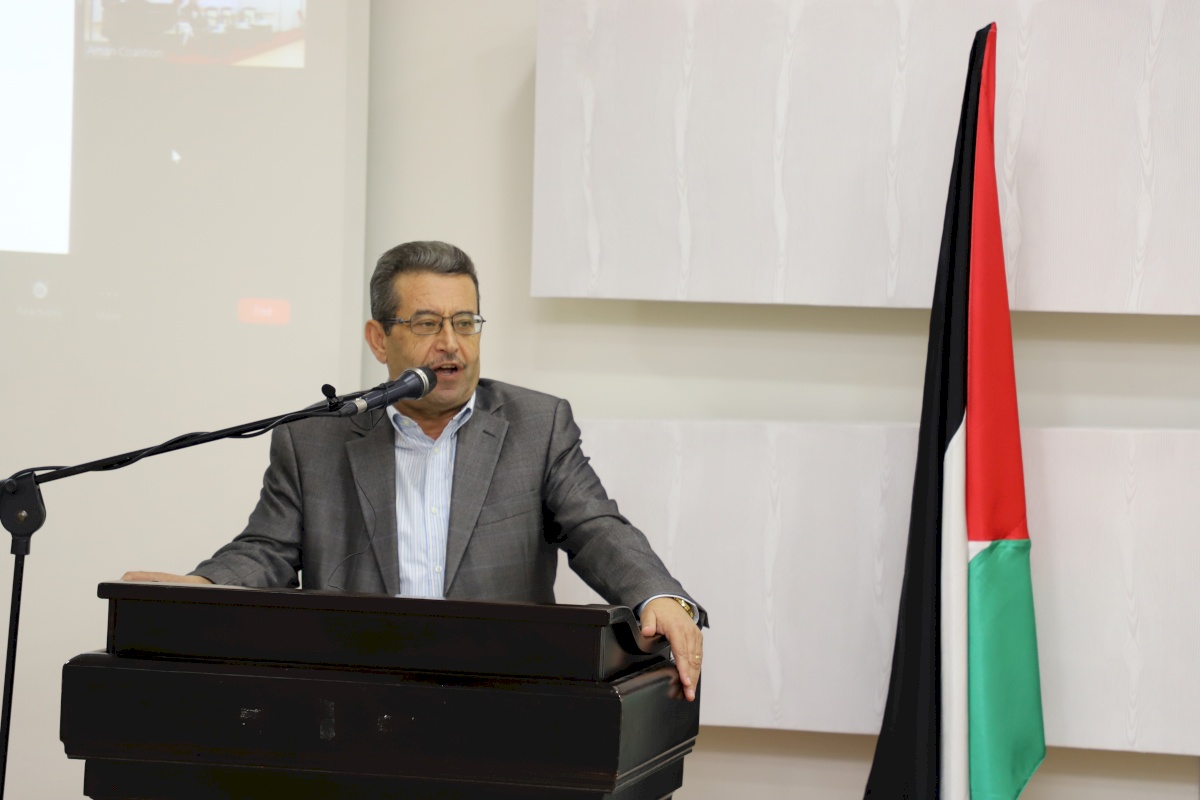
With an absent Ministry of Finance, the Civil Society Team for Public Budget Transparency holds its 2021 annual conference
Poor transparency in the management of public and natural resources, and
Weak political will to rationalize and control expenses
Deepen the financial crisis
Ramallah – 13 October 2021, The Civil Society Team for Enhancing Budget Transparency (CSTEBT) held its annual conference to discuss the public budget and review the public budget performance in the first half of 2021. Discussants shed light on areas of budget rationalization and control under the financial crisis endured by the Palestinian National Authority (PNA), with a special focus on governance integrity in the management of public and natural resources and wealth. The conference closed with objective recommendations to rationalize and control expenditure within the revenues available without impacting the provision and quality of services, in a manner that decreases budget deficit and accumulation of government debt and arrears.
CSTEBT does not substitute the Legislative Council
The chair of the board of AMAN Coalition, Mr. Abdelqader Al-Husseini, presented in his opening speech a diagnosis of the current difficult economic conditions and consecutive financial crisis. He started with the occupation’s hacking of Palestinian financial resources via its control over the customs and taxes clearance money. Al-Husseini then discussed the international change in funding, foreign aid and grants’ priorities and limited resources. The result of this situation was an increased budget deficit and access to credit, which subsequently raised the arrears and laid additional financial burden on the government in a manner that undermined public services.
The chairman reiterated that CSTEBT does not represent a substitute of the Palestinian Legislative Council but rather supports its oversight role. It is a partner in the formulation of financial policies that can overcome the current crises and respond to citizens’ priorities while promoting social justice. He called for the organization of general elections to revive democracy and institute an official oversight and accountability system through the PLC to achieve democracy and justice in governance.
Al-Husseini: Citizens are partners in the formulation of governmental policies.
The Ministry of Finance must publish periodic reports and data
In his intervention, Al-Husseini underlined the need to adopt a participatory approach in the management of public affairs, with representatives from the government, civil society and private sector. He also underscored citizens’ right to access information and take part in the conceptualization of government policies. He called for the serious consideration of CSTEBT recommendations and disclosure of financial information, reports and data. He also said he was sorry the Ministry of Finance did not participate in the conference although the Minister of Finance had confirmed attendance. This absence raises questions about the social participation principle.
In camera approval of public budget while ministries do not publish their budgets
In the first session, researcher Lamis Farraj, CSTEBT Coordinator, presented the semi-annual report on the performance of the public budget 2021. She explained the team’s comments as the President ratified the 2021 public budget after secret approval by the government. It was published only in brief without any detailed items to show the allocations to the different centres of responsibility. Citizens could not review the detailed allocations because ministries have not published their respective budgets on their websites. The Ministry of Finance published the citizens’ budget six months after the beginning of the year, but the detailed budget has not been published to date.

Customs duties collected via the clearance system represent four times the duties locally collected
The overall public revenues in the first year on accrual basis reached NIS 6,789 million, being 50% of the projected revenues in 2021. Local revenues attained NIS 2,396 million, indicating a slight improvement in tax collection. Revenues from clearance with the Israeli side reached NIS 4,709. The PNA endures losses because of the financial leaks. The figures are mainly derived from importation via Israel. Comparing locally collected customs duties with the duties from the clearance system reveals that the clearance collection is four times the local collection.
The Water Authority, Ministry of Education, Ministry of Interior and National Security receive the highest share of developmental expenses
Developmental expenses for the year 2021 were estimated at NIS 2,392 million, NIS 1,534 million of which will be secured via the public treasury while NIS 868 million from external grants and assistance. Tracking the developmental expenses of the centres of responsibility on accrual basis shows that the highest share (15%) was dedicated to the Water Authority, Ministry of Education and Ministry of Interior and National Security.
Developmental expenses from the Public Treasury or aid on rehabilitation of security forces and support of the President’s security and political program amounted to NIS 50 million in addition to NIS 7 million under presidential and legislative elections.
NIS 30 billion of government liabilities: NIS 12 billion of public debts and NIS 18 billion of arrears to the private sector and Pension Fund
Pre-funding deficit totalled NIS 5,982 million while external funding stayed at NIS 2,298. Consequently, the budget law kept a financial gap of NIS 3,684 million noting that the arrears represented NIS 18 billion whether to the private sector or Pension Fund. The total public debt stayed at NIS 12 million.
In a comment by Dr. Raja Al-Khalidi, Director General of the Palestinian Economic Policy Research Institute (MAS), he referred to the inflated current expenses and net lending compared to public revenues reiterating that the situation must be reversed. He emphasized the need to implement a plan to solve the problem of arrears and net lending.
One of four transfers paid to poor families since the start of 2021
Only one of the four aid payments to poor families has been transferred, depriving these families from their allocations. It should be noted that throughout the past three years, only three of the four transfers have been made while the unpaid transfers will not be repaid. Therefore, the CSTEPBT recommended that the government devised a clear plan to rationalize expenses accounting for all centres of responsibility without jeopardizing the rights of the poor and social justice. The Ministry of Finance must pay all the transfers to enable the Ministry of Social Development pay them to eligible families.
Government needs to reform its public funds management strategy and combat tax evasion
CSTEBPT produced several recommendations to enhance government’s compliance with the principles of transparency and disclosure and to enable taxpayers and their representatives hold the government accountable. The Ministry of Finance needs to open to the civil society organizations and consult with them on the budget preparation to ensure optimal response to national priorities. The government needs to introduce reforms to its public funds management strategy to combat tax evasion, prioritizes developmental spending and allocate developmental budgets that do not rely on grants and assistance, which continue to shrink with changes in international aid priorities.

The problem lies in the management of resources not their scarcity. With limited resources, burdens need to be fairly distributed
In his paper, economic expert Dr. Nasser Abdelkarrem proposed solutions to the PNA financial crisis based on the fact that citizens are key contributors to the coverage of public expenditure. Their right to holding the government accountable for its public policies must be promoted. He added that the PNA’s financial crisis does not stem only from limited resources but also from the management of these resources. It is important to rationalize expenses and redistribute burdens in a fairer manner to protect the rights of the poor while under austerity.
Rationalization and budget-tightening by cleansing the salaries bill
The interventions proposed by Dr. Abdelkareem included amendment of the Civil Service Law to ensure control of expenditure, recruitment on short-term and consultancy contracts and appointments outside the regulatory framework. These reforms will cleanse the salaries bill and lead to systemic rotation of staff while putting an end to the short-term, consultancy and experts contracts on exceptional terms and conditions.
Necessary oversight of medical transfers
Speaking of the health sector, CSTEPBT stressed its call to ratify an effective health insurance law with balanced resources and coverage. The Council of Ministers needs to issue regulations on medical transfers and comply by these regulations while putting an end to the exceptional transfers. Qualified human resources and IT specialists must be recruited to follow up on treatment bills in Israeli hospitals to prevent any overpricing or manipulation of expenses. Internal and external control procedures must be applied to the departments in charge of medical transfers.
The people mandated the state to manage not to monopolize natural resources. Citizens may not be excluded, and the state must be held accountable
Without the presence of the President of the Energy Authority, Eng. Zafer Melhem, the CSTEPBT member, Mr. Moayad Affanah, spoke of the management of public and natural resources in Palestine. He underlined that the people are the owners of these resources and that they delegate its management to the state. This requires dule adopted policies and legislation to ensure they are managed with transparency and integrity since they represent a fertile environment for corruption if hegemonized by a single party without any popular oversight.

Secret agreements totally unknown to citizens under a poor legal environment
They key problems of the gas and fuel sector were discussed including non-promulgation of a regulatory framework for the sector and the Petroleum Authority. No details have been shared on the participation of the Palestinian side in the East Mediterranean Gas Forum, which includes Egypt, Israel, Greece, Cyprus, Italy, Jordan and Palestine. The Palestinian government and the Investment Fund as well as the Energy and Natural Resources Authority have not published any information on this Forum or the Palestinian rights to the gas to the east of the Mediterranean.
The general Coordinator of the BDS (Boycott-Disinvestment-Sanctions) Movement, Mr. Mahmoud Nawajaa, referred to the violation by some states of the international law to help Israel usurp Palestinian gas resources. He stressed on the total secrecy behind the signature of these agreements, which deepen economic dependency on the Israeli occupation.
Regarding the water sector, the Executive Director of the Water Sector Regulatory Council, Mr. Mohammad Humeidi, mentioned that the Council on service regulations (including water services) has not been vested with the full mandate that enables it to implement the law and perform its responsibilities and oversight of service providers. He alluded to the progress achieved in the area of water sector governance.
Competition in formality in the telecommunication sector
IT excerpt, Dr. Mashhour Abu Daqqah, explained that the Law on Franchise has not been issued while the law regulating the telecommunication sector of 2009 has not been fully implemented because of the differences between stakeholders on authorities. More importantly, the telecommunication sector regulatory agency has not been established. He added that no consultations have been organized in the preparation of the telecommunication law, while the public has been notified of the law only after its publication in the Official Gazette. He proceeded that competition in the sector is only in form and controlled, explaining that not details are available on the agreements with all types of telecommunication companies nor on the provisions of the new license granted to Oreedo Telecommunication Company.
It is necessary to enact a law on franchise granting and publish franchise contracts
The conference recommended completion of the legislations on the management of public and natural resources, mainly as regards franchise rights. It also stressed the necessity to enact and update legislations on natural resources, land law, Petroleum Authority, the Law on Competition and Prevention of Monopoly to address the problems in the sectors regulated by these laws.
Controls to prevent conflict of interest and hegemony of decisions
Another recommendation focused on the dissemination of instructions on the prevention of conflict of interest, handling of gifts, and reporting suspected cases of corruption, which the chairs and heads of boards and staff members of natural and public resources management departments must apply. Furthermore, the Council of Minister needs to review the franchise contracts on the exploitation of public and natural resources and wealth and ratify them prior to their implementation by competent bodies in the different sector, especially in the absence of the Legislative Council.
Promote accountability of the agencies vested with the exploitation of public and natural resources
CSTEPBT underlined the importance of oversight of the agencies in charge of management and exploitation of natural and public resources to enhance social accountability and apply transparency in the granting of exploitation franchise contracts. It is a must to put an end to the secret policies and publish these contracts to the public in full.
Dr. Azmi Shuaibi, Advisor to AMAN Coalition’s Board on Anticorruption, explained that the PNA is managing natural resources by handing responsibility over these vital sectors to politically appointed individuals, who act as advisors rather than charging this responsibility to the competent ministry. He mentioned that this policy has proven to be a failure since the persons who managed these files are fugitives and not subject to any legal accountability; they are charged with corruption cases. He reiterated that this hegemony accelerates sliding toward political corruption.
To watch the first session: https://fb.watch/8CCuNPEXRl/
To watch the second session: https://fb.watch/8CCBy33tYk/
